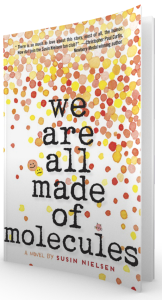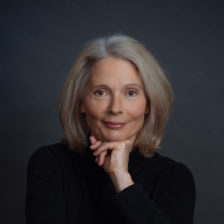 You began your career as an on-set caterer for a teen TV series, Degrassi Junior High. How did you turn this into a writing career?
You began your career as an on-set caterer for a teen TV series, Degrassi Junior High. How did you turn this into a writing career?
I loved writing, from a very early age. I wrote all the time. But I’d never put two and two together; I never thought about making a career out of it. I went to Ryerson in Toronto, Canada, for Radio and Television Arts, and even then I didn’t think about it – I thought I’d go into news reporting. But a short stint at a local news station put an end to that. I realized I couldn’t handle dealing with real-life tragedies. I did better in a fictional world! So I started getting jobs on movies – really, really terrible, straight-to-video slasher flicks – but I loved being on set. Then Degrassi came along, and it was actually a GOOD show, turned into a very successful show in fact, and it was sold all over the world. They hired me for that first season to feed the kids muffins, coffee and sandwiches (‘caterer’ would be a gross overstatement). I was terrible at it. So terrible that the kid actors on the show wrote a poem about me at the end of the first season:
An ode to Susin, the Bran Muffin Queen;
We eat them, we die, then we turn green.
But I loved working on the show. I knew I had to find something I was better at so that I’d get hired back. So in between the first and second seasons, I wrote a spec script – took characters I liked, gave them story lines I thought would work. I gave it to the head writer and asked for his feedback. He told me he didn’t think much of the script. BUT that he saw a spark in my writing, and he was going to give me a shot at writing an episode. That one episode turned into sixteen episodes of Degrassi Junior High and Degrassi High. The show became my training ground.
During my years there I also wound up writing four books in the Degrassi series – Shane, Wheels, Snake and Melanie. They revolved around events that had happened to the characters on the show. I really enjoyed writing them, and vowed that one day I would write an original young adult novel – it just took me many, many years! In the meantime I just kept writing for Canadian TV.
Where did the idea for We Are All Made of Molecules come from?
I seem to have an ongoing fascination with blended families; in my second novel, Dear George Clooney, Please Marry My Mom, Violet has to contend with her dad’s new wife and kids, and her mom’s new boyfriend, and with Molecules I wanted to take the idea one step further, and actually have two families merge into one. It’s probably not too hard for me to figure out where this fascination comes from; my own parents are divorced, I have half-siblings, both my parents are remarried . . . Now, my mom didn’t remarry until I was older and out of the house, but she married a man with four kids. I’m an only child and, don’t get me wrong, I love them all very much, but if all of this had happened when I was Ashley’s age . . . let’s just say I would have behaved far, far worse than Ashley!
That said, Stewart was the character who spoke to me first. I love writing about socially inept boys, it seems – I think Stewart taps into my younger, kinder, glass-half-full self, and Ashley taps into my meaner, more hormonal teenage self.
We Are All Made of Molecules explores some big themes such as bullying, homophobia, death and grief, and divorce. Did you set out to write about these things, or did they just come into the story as you wrote?
I never set out to write about any particular issue. I start from a place of character. In this instance I knew it was going to be a blended family. I knew it was going to be two narrators. I knew Stewart’s mom had died. I knew they were going to move in with this other family. I knew Ashley’s dad was gay. I will say that having a gay character, who is (hopefully) believable, likeable, and one hundred per cent accepted by Stewart from the get-go, was important to me. And I knew, of course, that Stewart and Ashley would not be a match made in heaven. And I think I knew the cat would go missing at some point. But I really had no idea where the story was going to go, what it would build to – I never really do. I have some vague notion of an end point, but it often shifts as I go along. I definitely make a lot of discoveries along the way, usually thanks to my characters. As they come into focus I learn more.
There’s often talk about how so many YA books have sophisticated, adult themes in them nowadays. Some people are worried about their suitability for a younger audience. And by adolescence, readers are selecting their own books. What do you feel about this debate? Do you think books should come with an age rating or similar?
Well, in an ideal world we would all still be shopping at our local bookstore, where the staff are familiar with what they’re selling, and may even be familiar with their customers, and can make recommendations accordingly. But of course that sadly isn’t the case anymore (though I’m lucky – I live 6 blocks from an excellent children’s bookstore).
I personally don’t think books should come with an age rating, but then again I’m one of those people who reads the back cover blurb and reads on line reviews and talks to my bookseller. I do see why booksellers have middle grade and YA sections – but isn’t that enough?
Middle grade and YA writers, when they are writing in an honest and frank way, open themselves up to sometimes surprising accusations and attacks. It’s happened to me before, and I wouldn’t be surprised (based on past experience) if it happens in ways I never could have anticipated with this book. But I think all an author can do is stay true to his or her voice and characters. I never, ever write anything with the intention to shock or titillate or upset. I’m just writing the best story I can.
Also, my best guess is that an age rating isn’t going to stop the complainers from complaining. I just read about a school in the States that has banned John Green’s The Fault in our Stars because a parent didn’t want her eleven- or twelve-year old to learn about mortality. Who would have seen that one coming? Does this parent really think her child hasn’t already thought about mortality? I am sure she was well meaning, but she’s effectively burying her head in the sand and trying to bury her kid’s head too. She’s blocking any chances at a meaningful, honest relationship. Imagine if she and her kid had read this book together and talked about the things they found upsetting. Now, that would have been cool. It makes much more sense to me to use well-written, compassionate novels (which John Green’s certainly are, and which, if I may be so bold, I’d say mine are, too) to open up interesting discussions between readers and parents and educators.
What was your favourite book when you were a teen? Have you read it since and does it stand up to memory?
Oh, you can’t ask me to pick just one.
Well my favourite middle grade book, by far, was Harriet the Spy. I recently re-read it, rather terrified – and it more than held up. I LOVED re-reading it. It made me realize just how much I’d been influenced by Louise Fitzhugh.
As for teen books, I loved everything by Judy Blume. I also loved My Darling, My Hamburger by Paul Zindel, which dealt with a teenage girl, an unwanted pregnancy, and an abortion. Can you imagine that book getting by today? I confess I have not re-read any of these ones recently although Judy’s books are still selling like hotcakes so they must hold up.
I can’t not mention To Kill A Mockingbird and Catcher in the Rye. And I did re-read To Kill A Mockingbird a couple of years ago, and it was beautiful. There are reasons why some books become classics.
When you write, do you know the whole plot before you begin?
No. Not even close. I think this is partly because of my TV background; in TV you have to outline things to death before you get to write an actual draft with dialogue, so for me, writing novels is liberating.
But it’s scary. I’ve started a new manuscript and I’m terrified that the story won’t unfold. I just have to sit at the computer and hope for the best. Which isn’t to say it’s entirely an organic process; I call it a mixture of organics and mechanics. I can’t just wait for the muse to strike, I have to plod forward, try things on for size. It’s hard work. But I also like not knowing . . . I like being surprised by my characters. And if I laid everything out ahead of time, I might miss some great opportunities by being to set on one path.
Are any of the characters based on people you know?
Ha-ha. If they were, do you think I would tell you? In all seriousness – no. I will sometimes lift a small characteristic, or a moment – ‘Truly thankful’ is something friends of mine do at every meal – but no. And I do have a friend who’s a TV news anchor, but she’s happily married. I know families that have been shattered by the death of a parent. I know of families where one half of the couple has come out of the closet. But again – no.
That said – and I didn’t even remember this when I was writing the novel, only later – I did experience a version of what happens to Ashley on New Year’s Eve, when I was thirteen. Not as harrowing, but certainly embarrassing. To this day I am grateful that cell phones hadn’t been invented yet. I do worry about young women (and men) growing up in a world where every little thing can be caught on camera.
Were you more of an Ashley or a Stewart at school? Or a bit of both?
A bit of both. More Stewart until I was around thirteen. Then definitely more Ashley. I was never, ever as bright as Stewart. And probably never quite as . . . um . . . academically challenged as Ashley. But I did have naïve ideas about boys, and romance, and being able to ‘change him . . .’
High school-set stories are a perennial favourite for films and TV – what’s your favourite in this genre? Have any of them influenced your books?
Well, I still think the original Degrassi series holds up (even if the fashions don’t). Another show I adored was the short-lived Freaks and Geeks. That was my high-school era, and they did a great job of capturing it. My So-Called Life was another great show. I loved The Breakfast Club, Rushmore, Mean Girls, Napoleon Dynamite, Gregory’s Girl and Welcome to the Dollhouse.
Stewart definitely shares some qualities with Jason Schwartzman’s character in Rushmore. And maybe Ashley has a little bit of Stephanie from season one of Degrassi Junior High.
